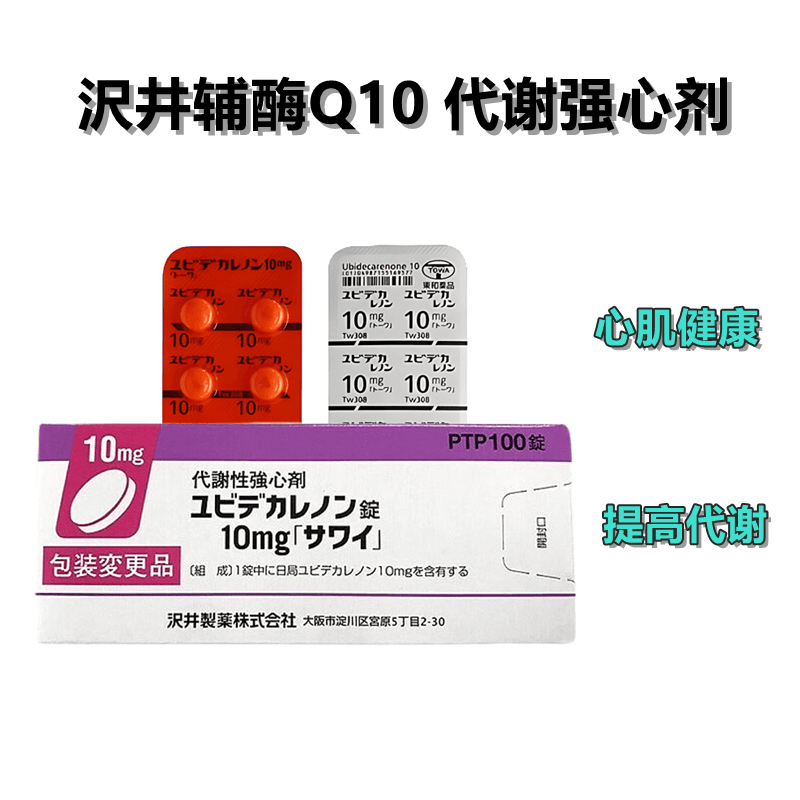In recent years, Coenzyme Q10 (CoQ10) has been hailed as a “magic protector” for the heart, with claims of its antioxidant, anti-cancer effects, as well as benefits for Parkinson’s disease, hypertension, and even skincare. But is it really that miraculous?

Ubidecarenone 10mg Sawai | CoQ10 Tablets for Heart Health & Metabolism (100 Tabs)
In recent years, Coenzyme Q10 (CoQ10) has been hailed as a “magic protector” for the heart, with claims of its antioxidant, anti-cancer effects, as well as benefits for Parkinson’s disease, hypertension, and even skincare. But is it really that miraculous?
? What is Coenzyme Q10?
Coenzyme Q10, also known as ubiquinone-10, is an anthraquinone compound and a fat-soluble substance similar to vitamins. It is widely distributed throughout the human body.
? Functions
Participates in aerobic cellular respiration
Plays a crucial role in mitochondrial energy metabolism
? Distribution in the body
The total amount of CoQ10 in the human body is around 500–1500 mg, mainly found in organs with high energy consumption such as the heart, liver, and kidneys, with the highest concentration in the heart.
? Where does Coenzyme Q10 come from?
About three-quarters (3/4) of CoQ10 is synthesized within the body, while one-quarter (1/4) comes from dietary sources.
? Foods rich in CoQ10
Sardines, saury (Pacific mackerel pike)
Beef (approx. 18.5 mg per 500 g), pork, animal organs
Peanuts
? Plant sources
Vegetables: spinach, peas (approx. 1.67 mg per 500 g), broccoli, cauliflower
Fruits: oranges, strawberries, apples
Grains: rye, wheat
? What are the health benefits of Coenzyme Q10?
✅ Officially recognized functions in China
Enhancing immunity
Antioxidant effects
(According to the “Coenzyme Q10 and Four Other Health Food Ingredients List” issued by the National Health Commission and National Administration of Traditional Chinese Medicine.)
❓ Heart protection?
Overseas, CoQ10 is marketed for heart health, antioxidant effects, and fatigue relief.
However, whether it can prevent cardiovascular diseases in healthy individuals remains inconclusive.
As a pharmaceutical, CoQ10 is mainly used as adjunctive therapy for cardiovascular diseases and hepatitis, and to reduce adverse effects of cancer radiotherapy or chemotherapy. It is not a first-line essential medication.
❌ Skincare benefits?
Skin aging is largely due to oxidative stress. While CoQ10 promotes skin metabolism and reduces oxidative damage, its absorption through topical application is poor.
There is no strong evidence supporting its effectiveness for whitening, spot reduction, or other cosmetic purposes.
❓ Other claimed benefits?
Effects on hypertension, Parkinson’s disease, or cancer prevention remain unproven.
? Who may need Coenzyme Q10 supplements?
For most healthy individuals with a balanced diet, additional supplementation is unnecessary. However, the following groups may benefit:
? Middle-aged and elderly people
CoQ10 levels peak in the 20s and decrease sharply after age 40.
? People with high physical activity
Intensive energy expenditure also consumes more CoQ10.
❤️ Patients with cardiovascular diseases or hepatitis
CoQ10 is used as an adjunctive therapy.
?️ Cancer patients
Can help reduce adverse effects from radiotherapy or chemotherapy.
? Patients on statins
(Atorvastatin, rosuvastatin, pitavastatin, simvastatin, etc.)
Statins may lower CoQ10 levels, and dietary intake may not be sufficient.
⚠️ Not recommended for: children, pregnant or breastfeeding women, people with allergies.
? Should you choose CoQ10 as a pharmaceutical or a health supplement?
? Appropriateness
Patients with diseases should follow doctor’s instructions and use pharmaceuticals.
For general immune support or antioxidant benefits, health supplements are acceptable.
? Quality assurance
Pharmaceuticals undergo stricter regulations and quality control.
Choose supplements from reputable manufacturers and official channels.
? Cost-effectiveness
More expensive does not always mean better. Choose reasonably priced products.
? Accessibility
In China, CoQ10 pharmaceuticals require a prescription. As of 2021, CoQ10 has been approved as a health food ingredient for daily supplementation.
? Recommended dosage
? For health supplement use:
30–50 mg/day (China’s recommended dosage)
⚠️ Overdose risks
High doses may cause: loss of appetite, nausea, diarrhea, palpitations, rashes, etc.
? Precautions when taking Coenzyme Q10
✔️ Take with or after meals (due to its fat solubility).
✔️ Consider reduced CoQ10 (ubiquinol) if budget allows, as it has 2–4 times higher bioavailability, especially beneficial for older adults whose conversion efficiency declines. However, it is more expensive.
✔️ Drug interactions: CoQ10 may reduce the anticoagulant effect of warfarin. Consult your doctor if you are on anticoagulants.
❌ Important
CoQ10 cannot replace medications prescribed for diseases. Never stop prescription drugs without consulting your physician.
? In Summary
While Coenzyme Q10 has antioxidant properties, it is not a miracle cure.
✅ Eat a balanced diet
✅ Supplement wisely if needed
✅ Always consult healthcare professionals
